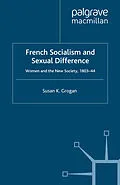This study explores the meanings ascribed to sexual difference in the theories of Charles Fourier, the Saint-Simonians and Flora Tristan. Their concept of 'the feminine' as a moral force justified a wide range of social roles for women. In addition, 'the feminine' became a symbol of the harmony and co-operation envisaged for the future. The study shows that, while these socialists challenged contemporary sex-role definitions, the new distinctions which they created nevertheless circumscribed the possibilities for female 'liberty'.
Autorentext
Susan Foley
Inhalt
Acknowledgements - Introduction - Charles Fourier and the Nature of Woman - Charles Fourier and the Roles of Women - The Saint-Simonians Discover 'Woman' - The Saint-Simonians Define Women's Social Roles - The 'New Moral Law' and Women's Sexual Roles - The 'New Moral Law', the Family and Motherhood - Flora Tristan and the Moral Superiority of Woman - Flora Tristan, Socialism and the 'Reign of Women' - Conclusion - Notes - Bibliography - Index
